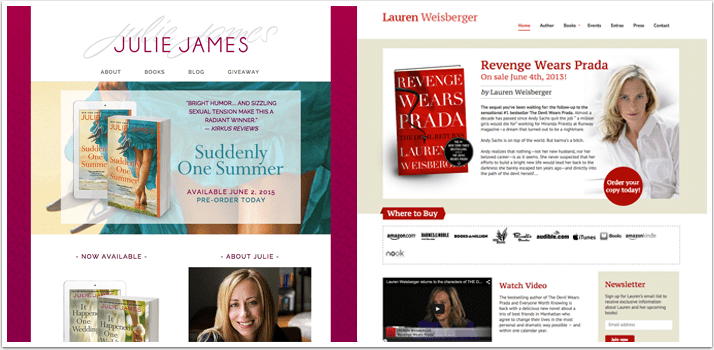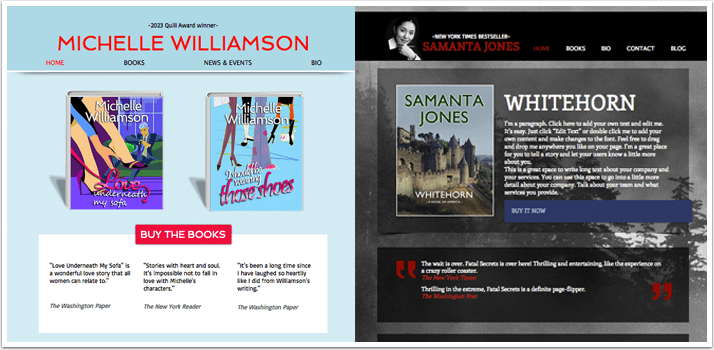Best Web Design Tools For Writers
 A few weeks ago, we shared the nine things every author website should have. These elements will ensure your site is a marketing asset that will help you sell more books and connect with fans. But what if your author site isn't up to snuff? You can't use the excuse, "But I don't know how to code!" anymore. There are several website building platforms that make it easy for you to create a beautiful and functional website in a few hours.
A few weeks ago, we shared the nine things every author website should have. These elements will ensure your site is a marketing asset that will help you sell more books and connect with fans. But what if your author site isn't up to snuff? You can't use the excuse, "But I don't know how to code!" anymore. There are several website building platforms that make it easy for you to create a beautiful and functional website in a few hours.
1. WordPress
Best for: authors who want a blog-centric site to regularly add content

Julie James | Lauren Weisberger
WordPress is the most scalable of these options. Although the out-of-the-box layout resembles a classic blog, you can create any sort of site with WordPress: add custom pages, galleries, contact forms, and sidebar widgets, and easily manage comments on posts and pages. Publishing blog posts is a breeze, as their WYSIWYG editor and media importer for uploading images is highly intuitive. There are also hundreds of beautiful free or inexpensive themes to choose from.
There are three ways you can set up WordPress:
- Self-host your WordPress site. Self-hosting gives you the flexibility to install any plugin and integrate your site with any third-party system. This is best if you're a little more tech-savvy or have a webmaster. While this version of WordPress is free, you need to pay for hosting, and providers like HostGator cost as little as $2.23 per month.
- Let WordPress host your site for free. This is a fine option if you don't need anything fancy, but isn't recommended because you can't customize your domain name.
- Pay for WordPress premium. If you want a custom domain name, (e.g. http://yourname.com instead of http://yourname.wordpress.com), to remove all ads, get extra customization capabilities, and get 10GB extra storage space for files and images, it costs $99 per year. This is the best option if you don't want to worry about hosting your site yourself.
If you're not tech-savvy, WordPress can take a while to set up and customize to your liking. If you plan on collecting email addresses from readers, either for your mailing list or blog subscription, you'll want to integrate a third-party email service provider like MailChimp or AWeber. For some authors, this might be a little too complex.
Helpful WordPress resources:
- Sign up for WordPress premium
- Tutorial for setting up a self-hosted WordPress site
- All the plugins you could ever hope for
2. Squarespace
Best for: authors who want a visually stunning website

Jamie McGuire | Martha Brockenbrough
Creating a Squarespace site starts by choosing a ready-to-go, beautiful template. There aren't many to choose from, which makes the decision much easier. You can drag-and-drop to reorder sections, and click-to-edit specific sections — no coding required. You can easily add a blog, galleries, and contact forms, and social media integration comes out-of-the-box. You don't need to know how to code to create a Squarespace site.
There is no self-hosted version of Squarespace, so you don't need to worry about being tech-savvy to take advantage of all the features they have to offer. Also, they have ready-to-go integrations with third-party apps like MailChimp for collecting email addresses.
Squarespace is beautiful, but there is no free version. The personal pricing plan is $96 per year, and the professional plan including unlimited pages and contributors is $192 per year. You can start a two-week free trial to see how you like it before making a decision.
Helpful Squarespace resources:
- Squarespace's pricing page
- Video tutorials for everything Squarespace
3. Wix
Best for: authors who want a visually stunning site with more options

Template #1 | Template #2
Wix's templates are stunning, and there's a wide variety to choose from. Whereas Squarespace has 26 templates, Wix has more than 500. While you must pay for Squarespace, Wix has a free option, though there are a variety of paid options to remove ads and customize branding. The most common pricing plan is $150 per year. They also take care of hosting for you.
The interface is easy to use, and entirely drag-and-drop. Simply swap in your own images, text, and information, and you're ready to go. However, once you pick a template, you can't change your template later. If you want to change your design later, you have to start from scratch. Customization is also limited because you can't access your site's HTML or CSS.
Helpful Wix resources:
- Wix templates designed for authors and writers
- Top 10 tutorials for Wix newbies
4. Weebly
Best for: authors who want something easy to set up

Aaron Galvin | April Borrelli
Weebly is one of the easiest website builders available. It comes with unlimited pages for free, and it's only $48 per year to remove Weebly branding and use a custom domain. It's a pure drag-and-drop website builder that's really intuitive, and you can place elements like pictures, paragraphs, buttons, contact forms, videos — basically everything you need to build a website and showcase your books in minutes. Weebly users can also embed a MailChimp signup form and other third-party tools directly on to their website using a drag-and-drop code block.
If you want to build a simple yet elegant website in minutes, Weebly could be the right option for you, but if you want more complex functionality you'll need to choose a platform like WordPress or Squarespace.
Helpful Weebly resources:
- Browse through hundreds of Weebly themes
- Weebly tutorial videos
5. Tumblr
Best for: authors who prioritize social networking and image sharing

Marie Lu | Robert Reich
Tumblr's biggest asset is its social networking capabilities. It's easy to reblog other authors' and readers' Tumblr posts, share images, follow other Tumblr blogs, and get followers from other Tumblr users. Many authors thrive on this networking capability.
Tumblr has ready-to-go themes to choose from, and you can pay anywhere between $20–60 for a fancier theme. You don't need to code anything if you really don't care about customization. There is no self-hosting option, and customizing your domain name is completely free. So you only ever have to pay if you want to buy a fancy theme.
However, Tumblr is not highly customizable. If you ever want to collect email addresses, host giveaways by embedding contest widgets, or create custom sidebars, it's challenging without knowing how to code. And even if you do know HTML and CSS, the coding tools are notoriously buggy and hard to use.
Helpful Tumblr resources:
- How to use a custom domain with Tumblr
- List of great Tumblr themes to choose from
Still want other options?
If you're not happy with any of these platforms, there are even more options out there to consider:
- Blogger — Google's original blogging tool is easy to use. Its themes are very basic, and you can't customize them much. However, it's completely free.
- Booklaunch — Create a single page for each of your books. Free for one page, $120 per year for unlimited pages, email signup functionality, and third-party integrations.
- HubSpot — A content management system, email service provider, social media tools, SEO tools, and more, all in one platform — but very pricy ($200 per month).
- Joomla — A free and powerful open-source platform for authors who are more tech-savvy.
Once your website is up and running, check out these 5 creative blog post ideas for writers!
Which platform do you use for your author website? Are you happy with it, or are you considering making a switch?
Want to share this post? Here's a ready-made tweet:
Click to tweet: WordPress vs. Squarespace vs. Weebly and more – which should you choose for your author website? 🤔 http://bit.ly/1ICjVNu
Click to tweet: Do you need to create an author website? This is a helpful guide on choosing a platform to host yours! http://bit.ly/1ICjVNu
Close
Best Web Design Tools For Writers
Source: https://insights.bookbub.com/top-platforms-for-easily-creating-your-author-website/
Posted by: merrywasee1983.blogspot.com

0 Response to "Best Web Design Tools For Writers"
Post a Comment